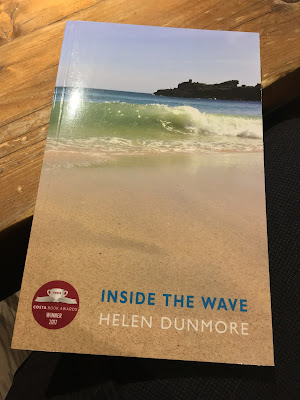Beginning With The End - Helen Dunmore's Inside the Wave
Literary prizes, despite the criticism and controversy that they always seem to stir up, still make you prick up your ears. They can cause you to hone in on a writer and give them a first chance. In particular, the Costa Book of the Year is one that always leaves me thinking 'why haven't I read anything by this writer yet?' Which then leads to an immediate placing of a reservation at my local library (may the gods bless them because the politicians certainly won't!) Sometimes this pays off: Helen McDonald's H Is For Hawk, the tale of unbearable grief and the training of a goshawk is wonderful. Sometimes I'm left underwhelmed: Sebastian Barry's Days Without End is a tedious tale of a gay Irish émigré in the American Civil War. So, as a barometer for what I'm likely to enjoy the Costa prize is probably useless.
Yet, here I am again, thinking 'why on earth have I not given Helen Dunmore the time of day?' On Monday night she won the 2017 prize for a collection of poetry called Inside the Wave. Sadly, it was a very different type of awards ceremony as the prize was given posthumously, the writer having died last summer. And, because of that, the first thing I encountered when seeking her work out was a poem attached to an obituary, one penned less than two weeks before she died, and the final piece that she ever wrote.
Beginning at the end felt somewhat ghoulish. The biography is inescapable, the initial sense of poignancy is overpowering. But it is a stunning poem that does something quite different from what you'd expect. Here it is in full:
Hold Out Your Arms
Death, hold out your arms for me
Embrace me
Give me your motherly caress,
Through all this suffering
You have not forgotten me.
You are the bearded iris that bakes its rhizomes
Beside the wall,
Your scent flushes with loveliness,
Sherbet, pure iris
Lovely and intricate.
I am the child who stands by the wall
Not much taller than the iris.
The sun covers me
The day waits for me
In my funny dress.
In my funny dress.
Death, you heap into my arms
A basket of unripe damsons
Red crisscross straps that button behind me.
I don’t know about school,
My knowledge is for papery bud covers
Tall stems and brown
Bees touching here and there, delicately
Before a swerve to the sun.
Death stoops over me
Her long skirts slide,
She knows I am shy.
Even the puffed sleeves on my white blouse
Embarrass me,
She will pick me up and hold me
So no one can see me,
I will scrub my hair into hers.
There, the iris increases
Note by note
As the wall gives back heat.
Death, there’s no need to ask:
A mother will always lift a child
As a rhizome
As a rhizome
Must lift up a flower
So you settle me
My arms twining,
Thighs gripping your hips
Where the swell of you is.
As you push back my hair
– Which could do with a comb
But never mind –
You murmur
‘We’re nearly there.’
(25 May 2017)
I've been reading it over and over again, and have still to read anything else by Dunmore. Like a lot of people, I have a real dread of dying. Not so much the state of being dead, rather those liminal moments that to me seem terrifying. But this poem calms me, soothes and reassures. Rather than anger or resistance we find Dunmore unambiguously welcoming death, embracing it as if it's a loving maternal-figure, one in which she utterly trusts. Not for her the 'rage' of Dylan Thomas’s celebrated villanelle - instead it's all about the opposite and 'going gently into that good night'. Neither is it tentative and unsure. Keats is testing the water and only 'half in love with easeful death', and he's still far too able to resist and imagine a world without the nightingale's song, one where that bird’s 'high requiem' is unable to reach the insensate vegetable matter that he worries he may be reduced to.
 |
| Bearded Iris |
Rebirth; the separation of the disease from death itself; a bearded iris and those roots that reach out laterally below the ground (rhizomes); memories of being a little girl, a backpack attached and ready for a distracting and not particularly inviting trip to school. But enough of me imposing my own thoughts on you. Poems are not riddles to be solved, and this one is no exception. Different readers will discover their own way into the woods. Although, I can't resist making one final observation. Death, or so we are often led to believe, renders insignificant our tiny vanities. But not here. That incredibly moving and vital last stanza, as the poet frets over the state of her hair, leaves a lump in the throat. But also, like the rest of the poem, allows the fear to dissipate. If the lightest of worldly cares can still possess us, even at the close, no need to be afraid.
Tonight I embarked upon the work of Helen Dunmore properly. I picked up the book, turned to the very first poem, and began 'Counting Backwards'.




Comments
Post a Comment